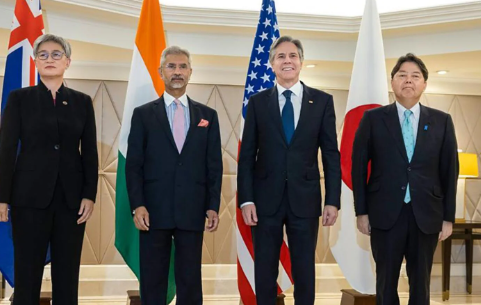Quad: Diplomacy and Cooperation in the Indo-Pacific (GS Paper 2, IR)

Introduction
- The Quadrilateral Security Dialogue (Quad), comprising India, Japan, Australia, and the United States, has emerged as a pivotal strategic partnership in the Indo-Pacific region.
- Initially conceived in the early 2000s and formalized in 2007, the Quad aims to promote a free, open, and inclusive Indo-Pacific, uphold international law, ensure freedom of navigation, and advance democratic values.
Genesis and Evolution
- The Quad was established to address shared challenges in the Indo-Pacific, including security threats and natural disasters.
- Over the past two decades, it has evolved from a concept into a robust diplomatic and security framework.
- The Malabar naval exercises and joint military exercises underscore its commitment to maritime cooperation and regional stability.
Key Working Groups and Initiatives
Quad Health Security Partnership:
- Focuses on collective responses to health emergencies, highlighted by the Quad Vaccine Partnership initiated during the COVID-19 pandemic.
- Expanded to include additional partners like South Korea, Vietnam, and New Zealand, reflecting its broadening scope beyond the original four members.
Climate Working Group:
- Launched the Quad Climate Change Adaptation and Mitigation Package (Q-CHAMP) to address climate challenges.
- Areas of collaboration include climate-smart agriculture, clean energy, and resilience-building against climate impacts.
Critical and Emerging Technology (CET) Working Group:
- Aims to set international standards and promote innovation in critical technologies such as AI, quantum computing, and biotechnologies.
- Enhances supply chain resilience and cybersecurity across Quad member countries.
Space Working Group:
- Facilitates collaboration in space exploration, satellite technology, and Earth observation for environmental monitoring and disaster management.
- Supports sustainable use of oceans and marine resources through shared data and technology.
Infrastructure Coordination Group:
- Addresses the Indo-Pacific's infrastructure deficit through transparent and sustainable financing initiatives.
- Aims to prevent debt-trap diplomacy and foster regional connectivity through joint projects.
Quad Senior Cyber Group:
- Enhances cybersecurity cooperation to protect critical infrastructure and mitigate cyber threats.
- Focuses on workforce development, software security standards, and supply chain resilience.
India's Role in the Quad
- India's participation in the Quad aligns with its strategic objectives in countering regional dominance, particularly by China, in the Indian Ocean and Indo-Pacific.
- It leverages the platform to enhance regional security, economic cooperation, and technological advancements while bolstering its global diplomatic footprint.
Challenges and Criticism
Despite its achievements, the Quad faces challenges:
- AUKUS and Strategic Focus: The emergence of AUKUS has raised questions about overlapping strategic priorities and potential dilution of the Quad's core objectives.
- China's Reaction: Tensions with China over territorial disputes in the South China Sea and unilateral actions challenge the Quad's stance on a free and open Indo-Pacific.
- Effectiveness and Skepticism: Critics question the Quad's efficacy due to its informal nature and lack of binding commitments among member states.
Future Prospect
- The Quad remains instrumental in shaping Indo-Pacific geopolitics, emphasizing shared values of democracy, rule of law, and economic prosperity.
- Moving forward, enhancing cooperation in climate resilience, technology innovation, and infrastructure development will be crucial.
- Strengthening institutional frameworks and addressing skepticism through tangible outcomes will solidify its role as a cornerstone of regional stability and prosperity.
Conclusion
- In conclusion, the Quad's evolution reflects its adaptability and strategic relevance in navigating complex regional dynamics, aiming to foster peace, security, and sustainable development across the Indo-Pacific.


